“What can I say. There’s pressure to be understood. To be taken seriously. I know that sounds ironic. And it’s rather perverse. If you would all be charitable here, allow me to ask about the line between telling a brisk and fast running tally of facts versus a shaping of those same facts into a story. Maybe, maybe I can do that with my own story. I could go ahead and list out for you my, my indiscretions or sins or violations or whatever you want to call them, when they happened, when they occurred to me, when I told the fact-checkers it was fine, or ‘don’t bother,’ et cetera.”
Conversations buzzes at a funeral-home level across the large curved space as he speaks. And it is a wake of sorts, but a send-off to what exactly, the many academics and literary critics and pundits gathered here are trying to figure out. The auditorium before the author is filled and the attendees’ expressions are examples of what could pass as rubber-necking. But the sniffling is rare, and purely the result of allergies. Many arms are folded, cradling the gawkers’ busts and torsos. Scowls and smirks, mouth-to-ear whispers that produce grave expressions on the listeners’ faces. Some giggles, some laughter. Again: How many of these lauded writers and memoirists like the speaker—who’d been brutally outed for plagiaristic transgression and outright fabrication—in pop psychology and history and even physics, would it take before “our general culture of enabling” became amenable to diagnosis and treatment?
At least that was the pretense; here was the treatment.
“But I couldn’t include my mental state at the time, what was going on in my head or soul or what have you. It wouldn’t enter into the fact-list be, because, well, that sort of thing, it’s unquantifiable. So a story might be better might capture the ultimate ding-an-sich of what’s under scrutiny? Why not? Sometimes a story just, just c-can’t be made to fit the list of facts. So something has to go, either the conceit of the ‘story aspect’ or some of the facts…I’d, I would also ask you to consider which is a worse practice: the omission of facts or the inflation or, uh, bending of them. We make choices."

“…We make tough choices as writers. I may have just avoided the tough choices in favor of confabulation. There were mistakes made in my recollection, memories that got well-elaborated in their recollection.”
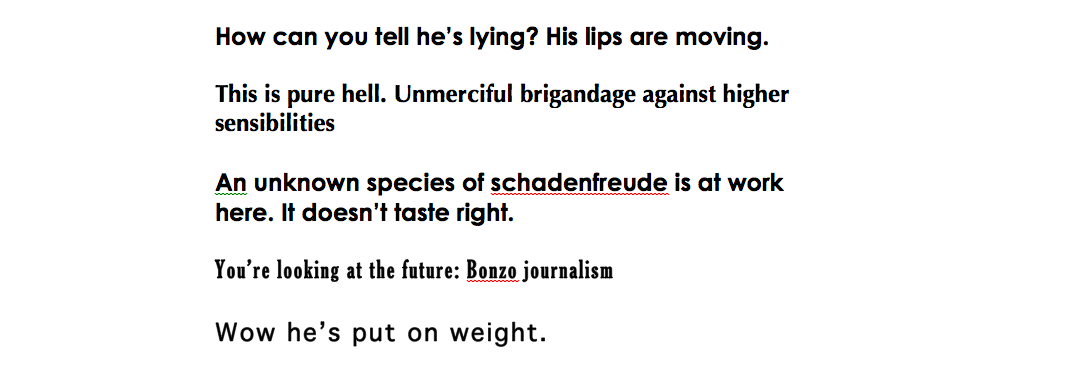
“…Now this can happen to anyone. In fact, the very studies I nutshelled and discussed in Neuro show that reality isn’t a very viable concept as far as the brain’s capacities are concerned. The, the seat of our consciousness is always d-divorced from its sensory input, off by at most seven-and-a-half seconds even sometimes, from our actual surroundings. On top of that, we interpret badly what we think we see. We see incorrectly then interpret with analytic overlay, which itself may be riddled with misconceptions. This is unavoidable. And so it’s unavoidable in my, in our, I mean, in our profession.”
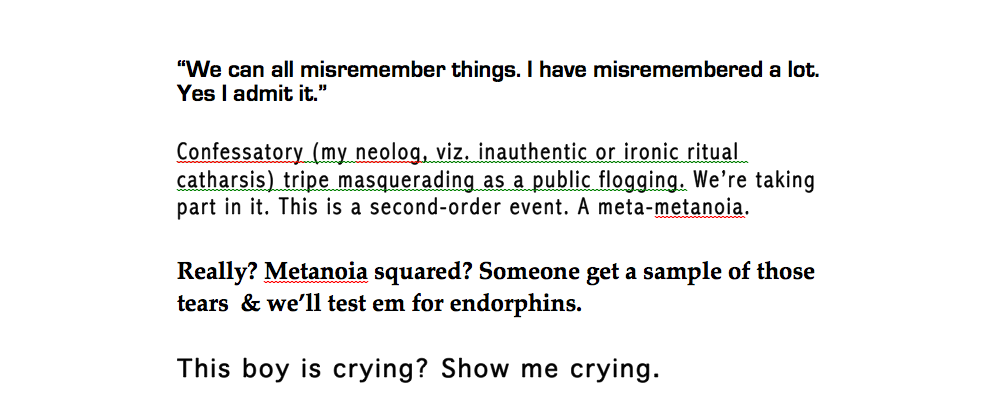

“…And in its place I made what I thought would be interesting contributions. Filling in the gaps. Now you’ll say that’s what fact-checkers are for. Yes. Of course. It’s not, it’s not like I coerced or paid off my very skilled staff to go play Warcraft or something. I had my staff, now gone, and Duckman has their staff. Now they took it on trust that my people did their due diligence. My people took it partly that I did my own due diligence. And I did. Mostly. What can I say.”

This last tweeted jibe gets a huge laugh and scattered applause. The author stops talking, his eyes widening and mouth closing and contracting into that classic penitent politician’s sex-scandal posture. He tries not to glance at the huge monitor to his left, fails, and hangs his head and continues. He can’t see the two plasma screens flanking the stage upon which he leans. And this was for a reason known to him and the audience both. They came and the spectators are laughing at their own displayed live-blog thoughts.
Theoretically, no one is supposed to know who is typing what, but by some irreducible rhetorical flourishes in a few of the comments the authors’ identities could be gleaned.
“...if someone such as myself can create quotes that pass for the source of attribution’s, as did, as did happen, there are few who can pass judgment on me. Yes, I fooled a lot of people. If I could ask one thing of you, my, my...colleagues...I’d invite you all to view a film by Orson Welles called ‘F for Fake.’ It may shed some kind of illumination on what passes for-uh, I was going to say culture but I guess I’ll use a much-battered phrase and say ‘consensus reality.’ Orson Welles’s film is about the cult of expert appraisal in the art world but it could as well apply to any profession with a hierarchy of values at stake. We value the expert opinion more than the work itself. It’s all in the imagination. Well. Anyway. As the forger Elmyr de Hory says in that film, if there’s one thing I want you to remember from tonight, it’s this, he says ‘if one of my fake Matisses hangs in a museum long enough, it becomes a Matisse.’”
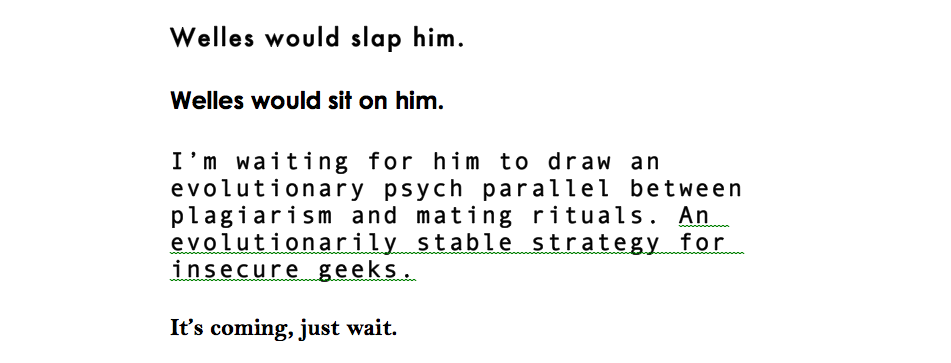

“…financially, I’ve paid for my mistake—ssss, mistakess. I could go into what revenue I have lost, based on my accountant’s numbers and my former agent and the PR people at Duckman…All I’ll say is it’s not insubstantial and yes it verges on the punitive, so there’s that. You, you can take some comfort in that. And as an author who has made the Times top ten with every book, to have those books pulled forever from all shelves…They’ll never be printed again. I can’t tell you what that feels like. It’s unique. It feels unprecedented, first of all.”
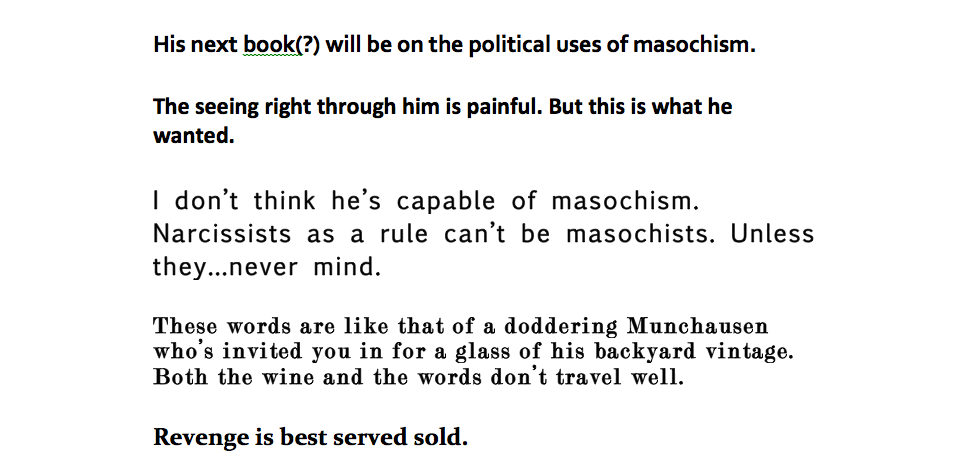

“There’s no way you, the public, can know what was confabulated and what was real, even after the fact-checking and rechecking was done. There’s, there’s still the possibility. And that’s what galls. And thrills, to be frank. That’s why the copies were, were pulled and some remaindered and some partially destroyed. There is a sense of new ground broken. You know, I’ve read David Shields’s Reality Hunger. If you haven’t, I think you should. Those two things are two things you can take away: watch Welles’s movie and read David Shields’s Reality Hunger. The lines between non-fiction and confabulation began breaking down a long time ago. David Shields would argue they never existed in the first place.”
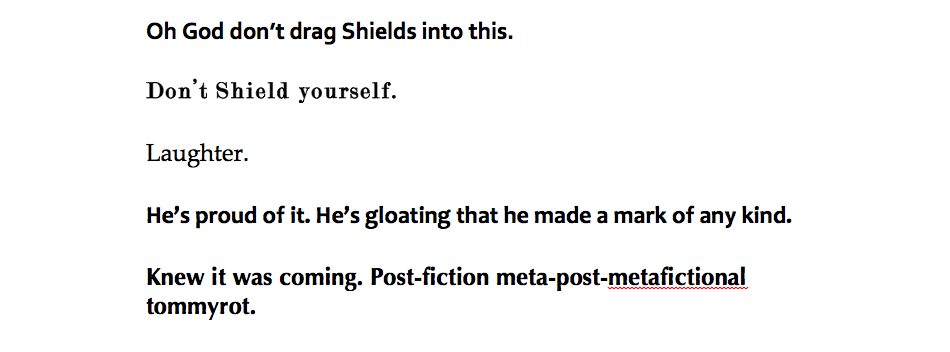
“I’m not asking for your forgiveness. That’s the last thing I’m going to ask for, is your forgiveness. You can forgive me if you want to but that won’t really mean much in the long run. I’m pretty much, you know, going to be broke very soon, so…I don’t know what else to say. I worked a long time on this presentation, and the wiring. Y-your forgiveness would be, I don’t know, if helpful is the right word or w-what…I don’t blame you for hating me. There might be a lot to hate. I got caught. Is that my sin, to get, to get caught? But you people just don’t know how I agonized over everything. Yeah there were nights w-without sleep. Lot of nights without sleep. You can’t possibly know what it’s like to have done something like this and then, and then live with it. Live with it every d-day, with the fear of getting caught. The fear of getting caught is a good stimulator. It stimulates you to even b-bigger crimes, in a vicious circle. But what kind of a, of a crime? I mean, come on now. Are crimes relative? I did certain things that are not accepted journalistic practice. At one time you would’ve said Hunter Thompson was doing the same thing in his writing except that the people who he wrote about couldn’t be tracked down for veracity. So he was given a pass. You gave him a pass. You people. Oscar Acosta—Dr. Gonzo, the Samoan attorney, you remember him—Acosta, he disappeared. Did, did anyone depicted in Fear and Loathing in Las Vegas remember T-Thompson and Acosta on those weekends and c-come forward to verify what they did? How about the underage girl, Lucy? No, of course not. They were all made up.”

The disgraced author’s sleeve and forearm are getting a workout on that forehead. He is sweating. “The authors of both fiction and non- are producers. He is the means of producing. He must produce or perish. For the past decades sectors of our globalized economy have severed themselves from indices reflecting the reality of production of tangible goods. You might call the new markets for exotic financial instruments parasitical on what was already parasitical. Can such a thing be reflected in the realm of publishing? I mean, can the methods of transnational capitalism like just-in-time production and p-post-Fordism be grafted onto literary practices? Look at James Frey’s writers’ factory. Or, or James Patterson’s stable and novels. Are Frey or Patterson authors or j-just brands? That is why I have decided to do it here, and now.”

“What’s missing? What’s at the heart of it all? The sense of a loss of community. And the doors are locked. All of them are locked here. There’s no getting out. Hunter went out with a blast. I might as well. And take some company, a little solace. The, the evolutionary psychologists maintain that way back when, say, say 100,000 years ago, that ostracism from the tribe or social unit, whatever, whatever, it meant certain d-death for the pariah. He or she’d be cast out into the wilderness to fend for themselves. Some evo-psych people even say, some say our logical capacities were developed to distinguish who was lying within the tribe and what they were lying about—freeloading, let’s say. Or stealing. Stealing, sure. And the bodily visible cues for lying, written on the hairy c-caveman face, were seen in the more discerning minds of the tribe. This activated the circuits for logical thinking. Modus t-tollens and modus ponens were born. Now, now, now y-you see I’ve been done the same sorta deal you might say, 100,000 years later. But none of you c-caught it on my face. Or in the tone of my voice. I mean, I mean, you’re here. In celebration. It was words, the written words. We’re not cave people. It, it was lotsa words and it took a long time for someone to notice I had, I had cut and pasted chunks of my own writing from my blog to my books and my books to a..to a..to a later blog p-posting. At first. Then, then they checked other things and d-discovered I’d appropriated—rectified, let’s say, or recontextualized—someone else’s sentences or even a, a moderate-sized paragraph. Sometimes pages. So now, so now I’m being ostracized, but the world is very different from the c-caveman. Let’s admit it. I won’t ever get to publish again. Even, even with due, due d-diligence, the insurance costs will be too great. Advances w-will not be offered. But I insist, I insist, we should be together. Let’s, let’s be together, finally. You, my greatest critics, having at me, right now in, in real, real time. You came here. That is why I have decided to d-do it here, and now. Read this. You won’t feel it coming on un-until the last second. Th-then there’s nothing to be done. It took a long time to do it to every cushion.”
